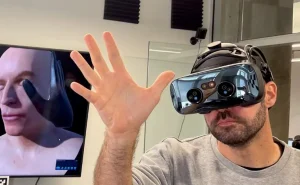Pioneering Virtual Reality Solutions for Modern Businesses and Beyond

There’s no surprise that in our rapidly evolving tech world, XR has emerged as a game changer, revolutionizing our digital experience. XR is an umbrella term encompassing various immersive technologies that blend the physical and virtual worlds or create fully immersive experiences such as Virtual Reality (VR), Augmented Reality (AR), and Mixed Reality (MR).
Virtual Reality (VR): Fully immersive experiences that replace the user’s real-world environment with a simulated one.
Augmented Reality (AR): Overlays digital information onto the real world, enhancing our perception of reality.
Mixed Reality (MR): Seamlessly integrates digital and physical elements, allowing real-time interaction between the two
Applications of XR
The versatility of XR has resulted in its adoption across various sectors. Here are examples of its applications within specific industries:
Manufacturing and Engineering:
- Product design visualization
- Virtual prototyping
- Effective remote collaboration among global teams
- Enhanced maintenance and repair operations
Education and training:
- Virtual tours and field trips
- Cost-effective virtual labs
- Engaging employee training
- Interactive learning experiences
Healthcare:
- Cost-effective virtual labs
- Safe and engaging methods for training
- Risk-free simulations for complex procedures
- Surgical planning
- Patient education
Retail and E-commerce
- Virtual try-ons
- Immersive product demos
- Enhanced shopping experience, both online and in-store
- Reduced return rates
Entertainment and Gaming
- Virtual concerts
- Highly immersive gaming experiences
- Interactive movies
Benefits of XR
- Higher levels of user engagement
- Improved learning and training in safe risk-free environments
- Increase safety in industries such as manufacturing and healthcare
- Enhanced visualization
- Cost reduction through virtual prototyping, remote collaboration, and lower operational costs
- Enhanced visualization of complex data, benefiting scientific research, architecture and real estate
Challenges of XR
- Despite its potential, XR faces several challenges:
- High development costs
- Hardware limitations in delivering seamless, high-quality experiences
- Privacy and Security Concerns due to vast amounts of user data collection
- Health concerns such as eye strain and motion sickness from prolonged use
- Need for specialized skills in XR content creation
As we look to the future, Extended Reality is set to play an increasingly significant role in our daily lives. From revolutionizing how we learn and work to transforming entertainment and social interactions, XR promises to provide highly engaging experiences, improve learning, enhance decision-making, reduce operational costs, and enable efficient remote collaboration. While challenges remain, the benefits of XR are too substantial to ignore. As technology continues to evolve, we can expect to see even more innovative XR applications that will create incredible experiences that were once only seen in science fiction.
